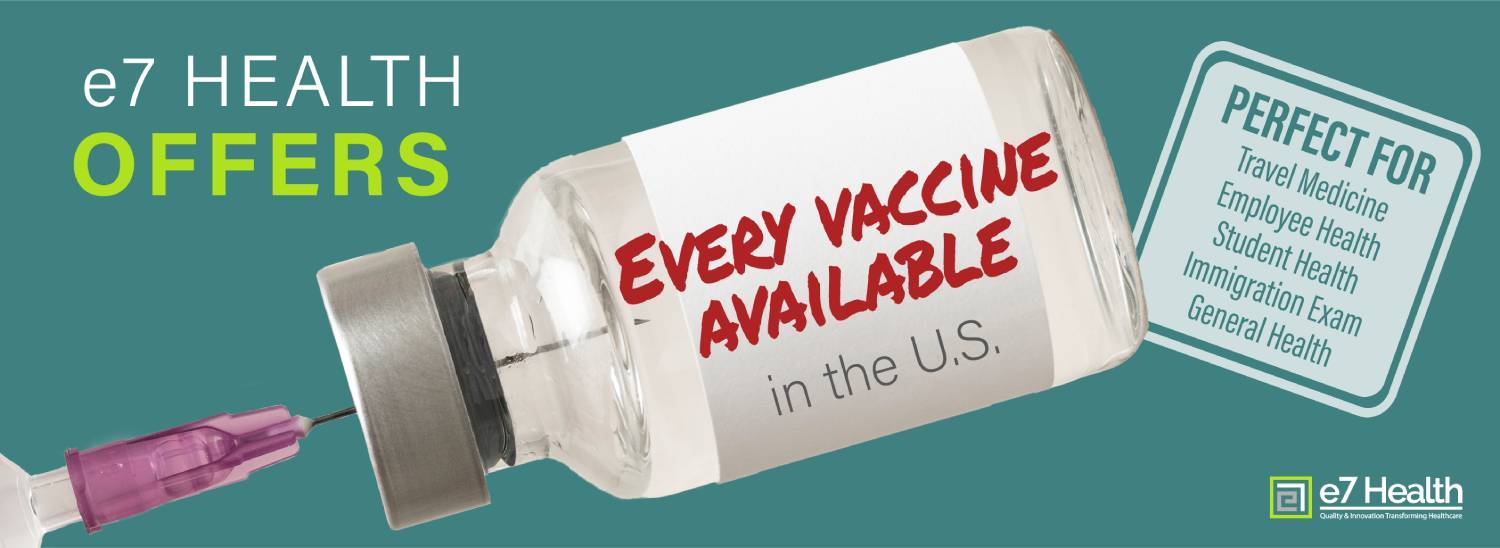Very friendly and super helpful with any questions I had. Very clean and calm atmosphere, all the staff were kind.
Read More
e7 Health offers every adult vaccine available in the US

Adult Vaccine Services
Book an Appointment Online
e7 Health is a preventative health and wellness company. Our company is supervised by Board Certified doctors. We provide comprehensive preventative health and wellness services. We offer same day or next day appointments and allow you to book your appointments online!
Our immunization services include all adult vaccines available in the US for work, school, travel, and general health.
e7 Health offers all adult vaccines available in the United States including:
Adult Vaccinations in a Series
If you need vaccines that come in a series, we schedule all follow up doses in advance. We even send you an email reminder when your next vaccine is due! Same or next day appointments are available for vaccinations and laboratory services with minimal to no waiting. e7 Health will provide you an official copy of your vaccine record from the state immunization database.
Adult Vaccinations for Travel
If you are traveling, we offer appointments with a travel medicine doctor or clinician who will review your specific itinerary. Along with your vaccines the travel consultation includes prescriptions that you may need for travel, counseling on food and drink precautions, insect precautions and other safety information.
Adult Vaccinations for Students
Students are often recommended and required to have vaccines for health sciences programs, dorm room living, study abroad programs, or just updating their childhood vaccines. We help students with all of their requirements for vaccines, tb skin testing or Quantiferon testing, titers to check for immunity, drug testing, and physicals. We also offer student discounts with your student ID or acceptance letter.
Adult Vaccinations for Employee Health
Our employee health services also include vaccinations, physicals, audiometric testing, vision screening, lift testing, and laboratory testing. We can work with employers to set up all your pre-employment screening. We can provide services on-site for employers.
Adult Vaccinations for Immigration
e7 Health is authorized by the Department of Homeland Security to provide vaccinations and medical examinations for Immigration and can help you complete your I-693 application. We can perform your vaccine assessment or the complete medical examination depending on your needs. We perform the tuberculosis test, RPR syphilis test, and medical exam required for USCIS.
Download Vaccine Information Statements (VIS)Recommended Adult Vaccines
e7 Health has ALL the recommended and/or required adult vaccines needed for your travel:

I came to E7 health for a physical exam for employment. Staff was very professional, And I was in and out in thirty minutes
Read More
Staff was extremely friendly, I was able to walk in without an appointment.
Read More
Very friendly, informative, and well versed. Felt well taken care of by the doctor and all the staff. Fast, friendly, considerate, all staff met.
Read More
I was here for an employment physical. They are amazing! I was in and out in less than 10 mins.
Read More
J was super helpful. Very quick and easy.
Read More
Rachel was amazing and I was in and out so quick ! Ready to start my new job ! Thanks 🥰
Read More
J was awesome at talking me through my first time getting blood taken. The doctor that also did my physical was quick and very thorough when letting me know the next steps for getting the test results back :)
Read More
















